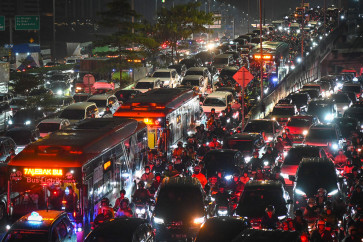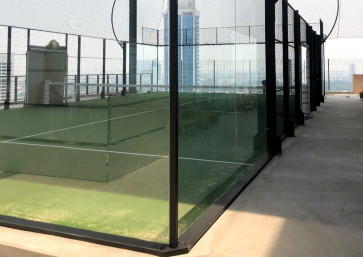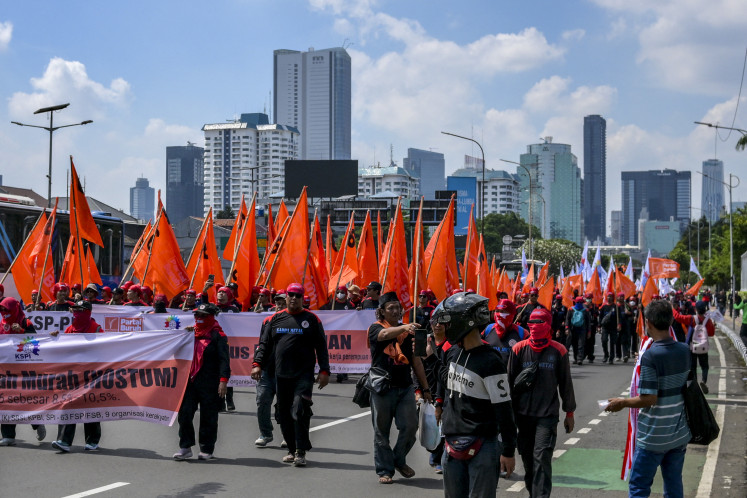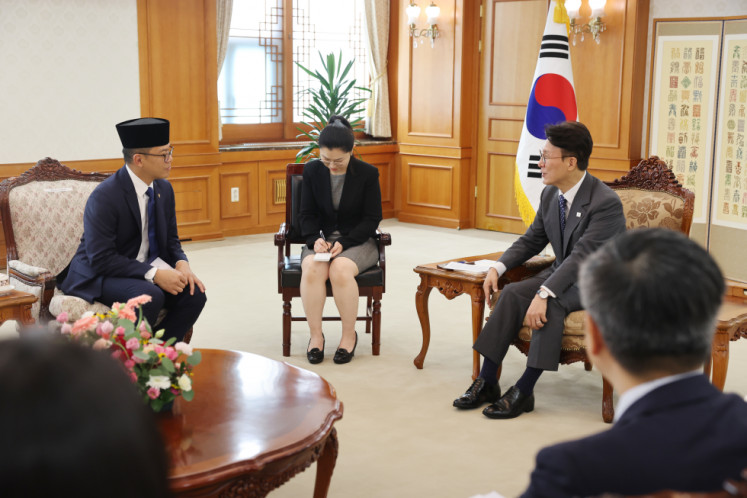Popular Reads
Top Results
Can't find what you're looking for?
View all search resultsPopular Reads
Top Results
Can't find what you're looking for?
View all search resultsDiscourse: We have a history of excessive use of intelligence, military resources
After almost a decade since the country was hit by a string of terrorist attacks, Indonesians have finally witnessed the birth of an interdepartmental counterterrorism unit, the National Antiterrorism Agency (BNPT)
Change text size
Gift Premium Articles
to Anyone
A
fter almost a decade since the country was hit by a string of terrorist attacks, Indonesians have finally witnessed the birth of an interdepartmental counterterrorism unit, the National Antiterrorism Agency (BNPT). Led by police intelligence figure Insp. Gen. (ret) Ansyaad Mbai, the BNPT is expected to deliver thorough solutions for preventing terrorist attacks. In a recent interview with The Jakarta Post’s Dicky Christanto, Ansyaad talks about his plan to tackle terrorism in Indonesia. Here are the excerpts:
Question: What are your priorities as head of the BNPT?
Answer: We are going to take all necessary actions to intensify the hunt for remaining suspected terrorists who are spread throughout the country. With the assistance of military officers in the regions, we intend to widen our search.
It is expected that we are going to be able to narrow down their hiding areas since there will be more officers involved. Reactivating intelligence sources is also a high priority. We want to be able to identify and arrest suspects before they pose a danger.
Another important task is campaigning for people to treat more carefully the radical ideas spouted by hard-line clerics or activists. For those already doing time for terrorism, better rehabilitation programs are now being considered with the primary goal of preventing them from rejoining their former terror cells.
Would building separate facilities for terrorist suspects be included in future rehab programs for convicts?
With a budget limited to Rp 30 billion, I have to admit that it would be difficult for us to build such facilities.
We are now looking more at new treatments that hopefully will encourage convicts to resist further involvement in terrorist activity.
We are working with Saudi Arabian authorities, who have developed a distinguished program in which 3,000 to 4,000 terrorist convicts participate.
Through this program, convicts are invited to discuss their radical ideologies with experts. A team of psychologists and religious experts then monitor the convicts’ development, including changes in their behavior regarding radical ideas. Those who become neutral toward the wrong idea of jihad have a higher likelihood of being released. Financial assistance is also given in order to empower them economically.
Who is going to lead the fight against terrorists?
The police’s counterterrorism unit, Detachment 88, will take the lead with military resources on standby. So whenever the police need back-up, the military is available.
The use of military resources and intelligence has sparked controversy among the public, especially from human rights activists. How do you justify that?
I am fully aware that we have a tainted history of excessive use of both intelligence and military resources. But I have also learned from experience that no country has been able to tackle terrorism by abandoning its military and intelligence resources.
Intelligence reports, for example, could present highly qualified evidence for us to exercise precaution that in the end would help prevent another bombing. Therefore, what we are going to do is reinforce the use of both intelligence and military resources, but this time with clearer yet stricter rules and regulations.
What do you mean by stricter regulations?
We need to set the rules of the game first. We have to be clear on how far the intelligence and military can go in the area of combating terrorism. We can learn from the UK, where military officers are no longer subject to special military law in their battle against terrorism. If a military officer is found committing certain violations, they are tried in civilian courts. This approach ensures more transparency and accountability.
If you were to evaluate the current state of our fight against terrorism, what changes would you suggest?
Our antiterrorism law should impose more severe punishment, especially for those who play supporting roles. The law should also able to reach those who encourage terrorism in any form, such as radical clerics or intellectuals who preach hatred instead of love and morality. These people should be held responsible as well as their terrorist counterparts.
What steps are you taking to fix weaknesses in the law?
The Coordinating Political, Legal and Security Affairs Ministry has proposed revising the law. The new version would impose heavier punishment not only on those directly involved with terrorism, but also on those who encourage terrorism in any form.
We have handed a draft to the Justice and Human Rights Ministry and it is expected that they will deliberate the draft with the House of Representatives at the upcoming House session.
There are reports some politicians from Islamic parties oppose the revision because they worry that once passed into law, it may affect their parties’ cadres’ religious activities. Is that true?
Yes. I have to say that we are currently facing opposition from those politicians. But I truly believe that we are going to be able to fix that problem because I know that their disagreement is mainly based on fear of the excessive use of force and not because they silently agree with radicals. I am optimistic that we will work it out.










